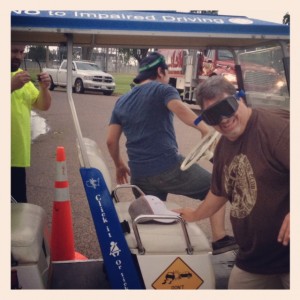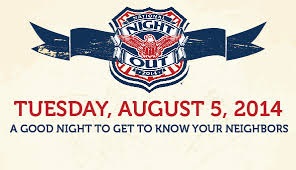
National Carriers is dedicated to crime prevention and will once again participate in National Night Out on August 5, 2014. With the support of the Liberal, Kansas Police Department, NCI will have live demonstrations utilizing a Say No to Impaired Driving cart available for licensed drivers to drive an obstacle course while wearing impaired driving goggles. The goggles imitate the vision and balance impairment experienced while intoxicated. NCI cart coordinator Ed Kentner explains, “It is the sincere desire of National Carriers to give each licensed driver the opportunity to experience the limitations of an incapacitated driver. Hopefully this opportunity will educated the public to the dangers of impaired driving.”
Liberal, KS
National Night Out will be held at Blue Bonnet Park on August 5, 2014 at 5:30 PM. Come out for a great night of games, live entertainment and free food. Booth space is available from businesses, civic organizations or religious groups who wish to spread word about your organization. If you are interested in a booth contact Sgt. Jared Ratzlaff at jared.ratzlaff@liberalpd.org
Office Ratzlaff shared, “This is the fourth year Liberal has participated in National Night Out. Last year we estimated the crowd was between 1000 -1200 people. This event allows the people in our neighborhoods to meet Liberal’s first responders in a controlled setting and learn what services are provided to our community.
Irving, TX
A representative of the Irving, TX police department commented on National Night Out, “Due to the Texas heat the state of Texas observes October 7th as National Night Out. Local neighborhoods organize local events and register with the Irving police department. We send officials to each event for interaction with people in the neighborhood. Last year we had 45 neighborhoods register with our department.”
History
National Association of Town Watch (NATW) is a non-profit organization dedicated to the development and promotion of various crime prevention programs including neighborhood watch groups, law enforcement agencies, state and regional crime prevention associations, businesses, civic groups, and individuals, devoted to safer communities. The nation’s premiere crime prevention network works with law enforcement officials and civilian leaders to keep crime watch volunteers informed, interested, involved and motivated. Since 1981, NATW continues to serve thousands of members across the nation.
The introduction of National Night Out, “America’s Night Out Against Crime”, in 1984 began an effort to promote involvement in crime prevention activities, police-community partnerships, neighborhood camaraderie and send a message to criminals letting them know that neighborhoods are organized and fighting back. NATW’s National Night Out program culminates annually, on the first Tuesday of August (In Texas, the first Tuesday of October).
NATW’s Executive Director, Matt Peskin introduced National Night Out in 1984.The first National Night Out took place on Tuesday, August 7th 1984. That first year, 2.5 million Americans took part across 400 communities in 23 states.
National Night Out now involves over 37.8 million people and 16,124 communities from all fifty states, U.S. Territories, Canadian cities, and military bases worldwide.
The traditional “lights on” campaign and symbolic front porch vigils turned into a celebration across America with various events and activities including, but not limited to, block parties, cookouts, parades, visits from emergency personnel, rallies and marches, exhibits, youth events, safety demonstrations and seminars, in effort to heighten awareness and enhance community relations.
Peskin said, “It’s a wonderful opportunity for communities nationwide to promote police-community partnerships, crime prevention, and neighborhood camaraderie. While the one night is certainly not an answer to crime, drugs and violence, National Night Out represents the kind of spirit, energy and determination to help make neighborhoods a safer place year round. The night celebrates safety and crime prevention successes and works to expand and strengthen programs for the next 364 days.”